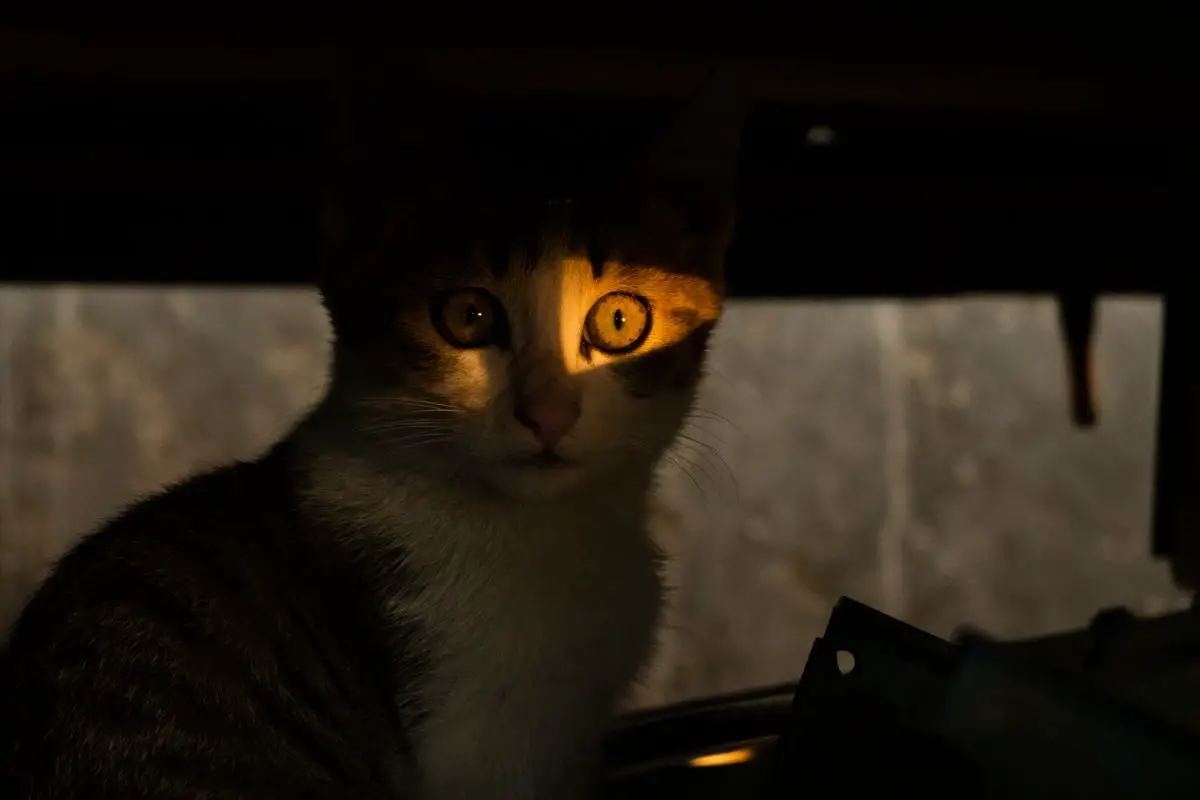Snakes can be terrifying creatures. That’s why many people believe that cats can sense the presence of a snake by feeling, hearing, or sensing it in some other way. But can they? or is this some common urban myth?
It turns out there is quite a bit of science behind this, so I did my homework and asked a few experts as well, and here is what I’ve found.
So, can cats sense snakes? Cats can sense snakes and detect their presence even when they can’t see them. Cats can sense movements even in very poor lighting, and they have extremely sharp smell and hearing. Cats can also sense movements with their whiskers and feel the snake’s presence.
This all makes sense when you know that cats are natural predators of snakes and that they are natural enemies.
In this article, I’m going to dig deeper into how your cat can sense snakes better and what a cat would actually do when it detects a snake, as well as how to keep your cat (and family) safe from snakes, so stick around…
Contents
How can cats sense snakes?
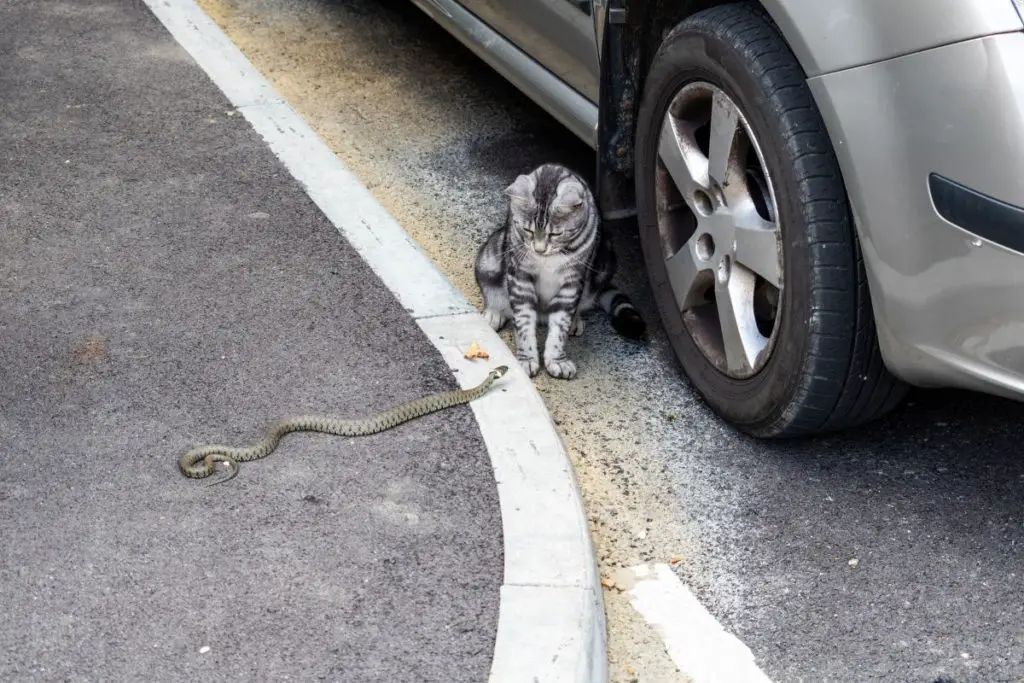
Cats can detect snakes earlier and more accurately than humans.
They have a greater awareness of their surroundings than us or most other animals, and some even claim that cats have the ability to sense things that are beyond our physical capabilities, but that’s a topic for another post.
Here is a breakdown of how cats can actually sense snakes:
- Acute hearing: Cats have very sharp hearing which means they can hear the very slight sounds snakes make while moving from the friction with the ground, which we as humans would probably not be able to pick up.
- Acute sense of smell: Cats have an acute sense of smell and they are able to detect the slightest changes in the smell in the environment, and it can pick up on the smells of the snakes.
- They can detect motion better: Cats are much better than humans in detecting motions even in dim light.
- They see in low-light: While cats do not actually have night vision, as was believed earlier, they can still see very well in low light conditions.
- Their whiskers: The whiskers of your cat are amazing at sensing even the tiniest changes in the environment, including changes in the temperature, wind direction, air pressure, and even air currents.
Why can cats sense snakes?
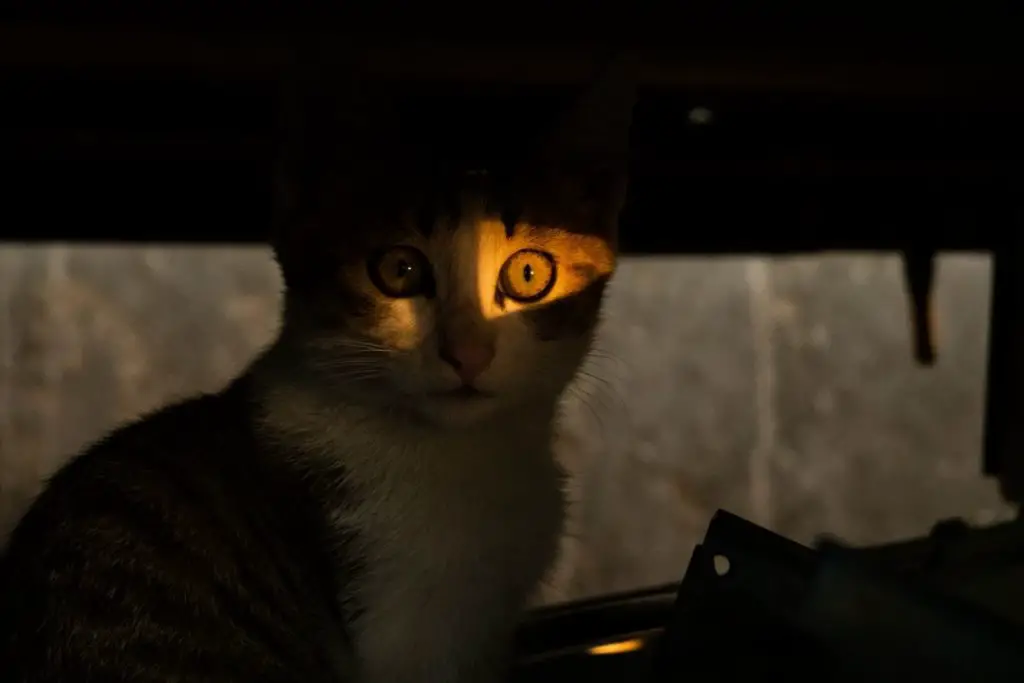
Cats are natural predators of snakes, so it makes sense that they have evolved to be so good at detecting snakes.
You can see their capabilities in your house with your own cat when it detects something you can’t see easily such as a hidden rodent or a small but strange bug it hasn’t seen before. You will see your cat fixated on the animal and wiggling its butt around as it gets ready to bounce on the intruder.
What happens if your cat senses a snake?
When your cat senses the snake, it is likely going to try to inspect it. Cats are intrigued by snakes and will probably try to approach Them.
However, some cats are less likely to do that than others, and some cats will be fearful and try to avoid confronting the snake altogether, especially if your cat has never been exposed to snakes or anything like it before in its life.
However, the most likely scenario is that the snake will try to flee before the cat gets to it. Snakes are afraid of cats and see them as dangerous predators, so they will try to flee before the cat corners and kills it.
How do cats hunt snakes?
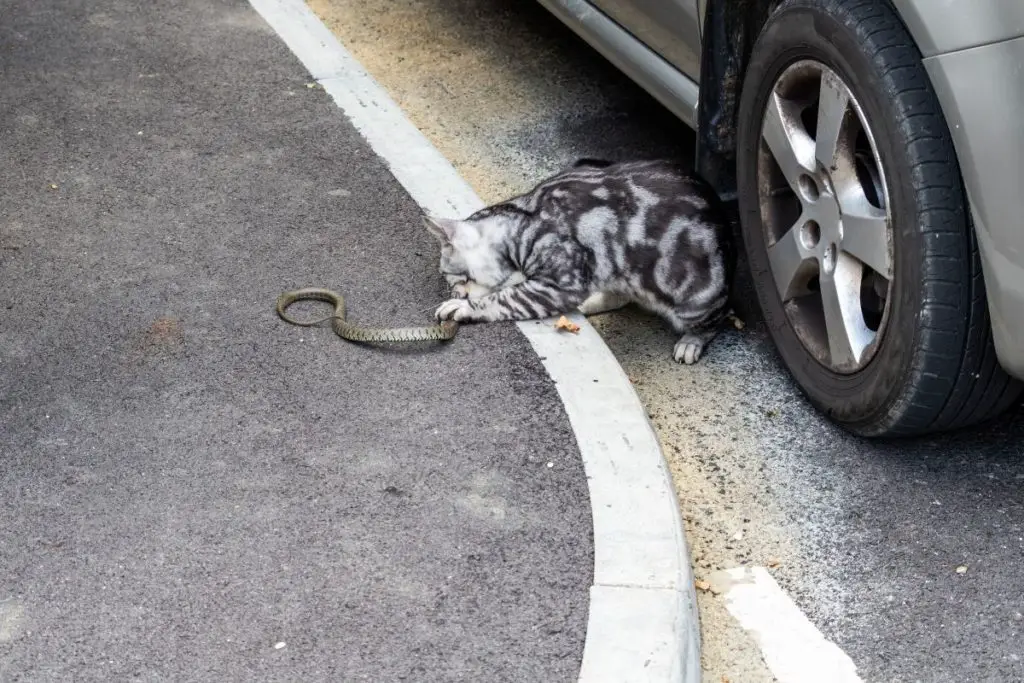
Cats hunt snakes by bouncing on the snakes and using their sharp claws to slash and pierce the snake’s asking.
Snakes fight back by striking the cat, but cats are often fast enough to be able to respond to the snake’s strike by hitting its head mid-way and then bouncing on the snake before biting the snake on its head, twisting or breaking the neck and paralyzing the snake completely.
The cat may then decide to kill the snake right away or just play with it and let the snake die a rather painful death. As many cat owners can testify, cats can be quite cruel like that.
The cat may then decide to play with the snake’s dead body like a robe toy or chew and nibble on it. A cat will rarely consume the whole snake.
The dangers of fighting snakes
Snakes may not be as dangerous as we believe them to be, but they are still dangerous. Even the smaller snakes can be quite dangerous. Snakes of all species and sizes can carry parasites that can infect the cat, venomous snakes can kill the cats with venom, larger snakes can squeeze the cat to death and some snakes are known to eat cats.
Do Snakes bite cats?
Snakes can and do bite cats, resulting in significant damage. Even while cats may attack snakes, they will defend themselves when cornered, irritated, or provoked.
Cats can get snakebites, whether poisonous or not, and they might result in wounds or infections. The strike or the fangs may also rib an organ or cause something else serious.
Some poisonous snakes have a venom that is so potent that can kill a snake within minutes of striking.
Here are the symptoms of poisoning in cats according to the RSPCA:
- Blood in Urine
- Twitches
- Eyes blinking
- Difficulty breathing normally
- Weakness
- Dilated pupils
- Loss of bladder and/or bowel control
- In extreme cases, paralysis and sudden collapse.
What to do if a snake bites your cat?
If a venomous snake has bitten your feline, they must go to the veterinarian right away. The species of the snake is one crucial piece of information that can greatly help the vet give the cat the right medical treatment.
The best thing would be to take a photo of the snake if you could, but if that’s not possible, then you should try to give a description that is as detailed as possible about the snake.
Carry your cat and rush it to the vet. Do not let it move a lot as this will accelerate the spread of the venom in its body.
Your Goal is to Bring your cat to the vet immediately without any delay.
How to keep your cat safe from snakes?
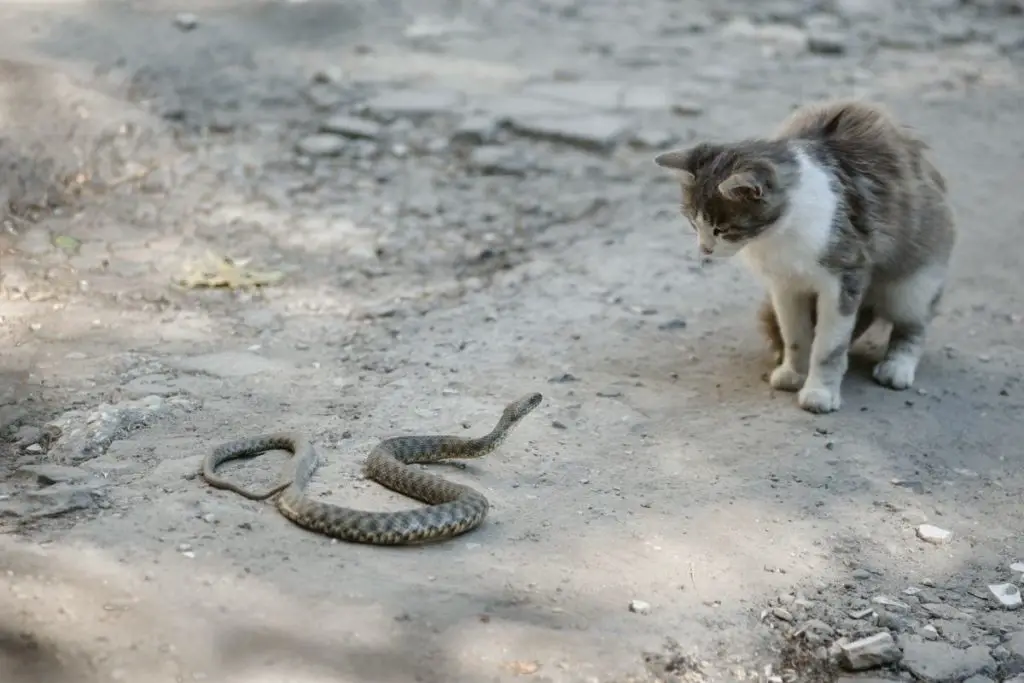
You may take measures to avoid snakes on your own property rather than risking your cat being injured by one or becoming ill after eating one. In my view, this is less hazardous than hoping your cat can deal with the snakes or even kill them.
Keep the Grass Short
Maintain your lawn throughout the summer as it grows. This will deter snakes. What is the reason? Long grass gives snakes the concealment they enjoy.
When grass is limited, snakes cannot travel freely without attracting attention from predators. It will also help you identify them before putting your foot on one!
Don’t Leave water outside
Snakes are attracted to water, so if you have any more accessible water sources on your property, get rid of them. This implies cleaning up any damp places, such as tarps where water might accumulate or a children’s paddling pool.
Maintain the Yard as Clean As possible
Snakes like to hang out in filthy areas, and unclean conditions attract them. If you have garbage strewn about your yard, a snake could enter it. Snakes like to hide in piles of wood.
Snakes and rodents are attracted to messes, particularly food or animal feces. This indicates that, if you’re feeding your cat outside, for some reason, the food bowls should be cleaned and replaced on a regular basis. The same may also be said for bird feeders.
Rats and mice may enter your yard as a result of the rubbish, enticing snakes to hunt and consume them.
Install a perch pole
Perches may be used to attract hawks and owls into an area, which helps keep snake numbers in check. Poles should be visible from the yard and the neighboring territory so that the hawk or owl has a clear view of both.
Seal any cracks
To keep snakes out of your home, sidewalks, and foundations, fill gaps and fissures.
If you don’t want to do this work yourself, why not hire someone to conduct an energy audit on your home? The findings of an energy audit may indicate air gaps and fissures that allow cold air to escape the property – these same flaws and crevices can be used by snakes and other small animals.
Related Questions
Why does my cat stare at my snake?
Your cat stares at your snake because the snake intrigues the cat and triggers its predatory instincts. The snake’s movement is fascinating to Cat, who is intrigued by the slithering of it – if you’ve played with the cat a lot, you know they enjoy chasing string or rope on the ground. Otherwise, it could be that the cat’s hunting instincts are in overdrive and the snake is in serious danger.
Helpful Resources
Responses by domestic cats (Felis catus) to snake scent gland secretions
An Exploration of the Amazing Cat Senses
Your Cat’s World: How Your Feline Uses His Senses
If you like this article, please share it!

